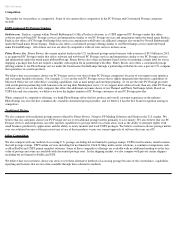Stamps.com 2013 Annual Report Download - page 21
Download and view the complete annual report
Please find page 21 of the 2013 Stamps.com annual report below. You can navigate through the pages in the report by either clicking on the pages listed below, or by using the keyword search tool below to find specific information within the annual report.
We could face competitive pressures from new technologies or the expansion of existing technologies approved for use by the USPS. We may
also face competition from a number of indirect competitors that specialize in electronic commerce and other companies with substantial
customer bases in the computer and other technical fields. Additionally, companies that control access to transactions through a network or Web
browsers could also promote our competitors or charge us a substantial fee for inclusion. In addition, changes in postal regulations could
adversely affect our service and significantly impact our competitive position. We may be unable to compete successfully against current and
future competitors, and the competitive pressures we face could seriously harm our business.
If we do not respond effectively to technological change, our services and products could become obsolete and our business will suffer.
The development of our services, products and other technology entails significant technical and business risks. To remain competitive, we must
continue to enhance and improve the responsiveness, functionality and features of our online operations. The Internet and the electronic
commerce industry are characterized by rapid technological change, changes in user and customer requirements and preferences, frequent new
product and service introductions embodying new technologies, and the emergence of new industry standards and practices.
The evolving nature of the Internet or the postage markets could render our existing technology and systems obsolete. Our success will depend,
in part, on our ability to (i) license or acquire leading technologies useful in our business, (ii) enhance our existing services, (iii) develop new
services or features and technology that address the increasingly sophisticated and varied needs of our current and prospective users, and (iv)
respond to technological advances and emerging industry and regulatory standards and practices in a cost-effective and timely manner.
Future advances in technology may not be beneficial to, or compatible with, our business. Furthermore, we may not be successful in using new
technologies effectively or adapting our technology and systems to user requirements or emerging industry standards on a timely basis. Our
ability to remain technologically competitive may require substantial expenditures and lead time. If we are unable to adapt in a timely manner to
changing market conditions or user requirements, our business, financial condition and results of operations could be seriously harmed.
Our operating results could be impaired if we or the Internet become subject to additional government regulation.
Changes in the laws and regulations applicable to the Internet or us, including those relating to user privacy, pricing, content, copyrights,
distribution, characteristics and quality of products and services, and export controls, could seriously harm our business, financial condition and
results of operations. Moreover, the applicability of existing laws to the Internet is uncertain with regard to many issues, including property
ownership, export of specialized technology, sales tax, state income taxes, libel and personal privacy, and changes in their interpretation could
similarly harm us. The application of laws and regulations from jurisdictions whose laws do not currently apply to our business, or the
application of existing laws and regulations to the Internet and other online services could also harm our business.
We have employees and offer our services in multiple states, and we may in the future expand internationally. These jurisdictions may claim that
we are required to qualify to do business as a foreign corporation in each state or foreign country. Our failure to qualify as a foreign corporation
in a jurisdiction where we are required to do so could subject us to taxes and penalties. Other states and foreign countries may also attempt to
regulate our services or prosecute us for violations of their laws.
We Do Not Collect Sales or Consumption Taxes in Some Jurisdictions
U.S. Supreme Court decisions restrict the imposition of obligations to collect state and local sales taxes with respect to remote sales. However,
an increasing number of states have considered or adopted laws or administrative practices that attempt to impose obligations on out-of-state
retailers to collect taxes on their behalf. A successful assertion by one or more states or foreign countries requiring us to collect taxes where we
do not do so could result in substantial tax liabilities, including for past sales, as well as penalties and interest.
17
Table of Contents
























